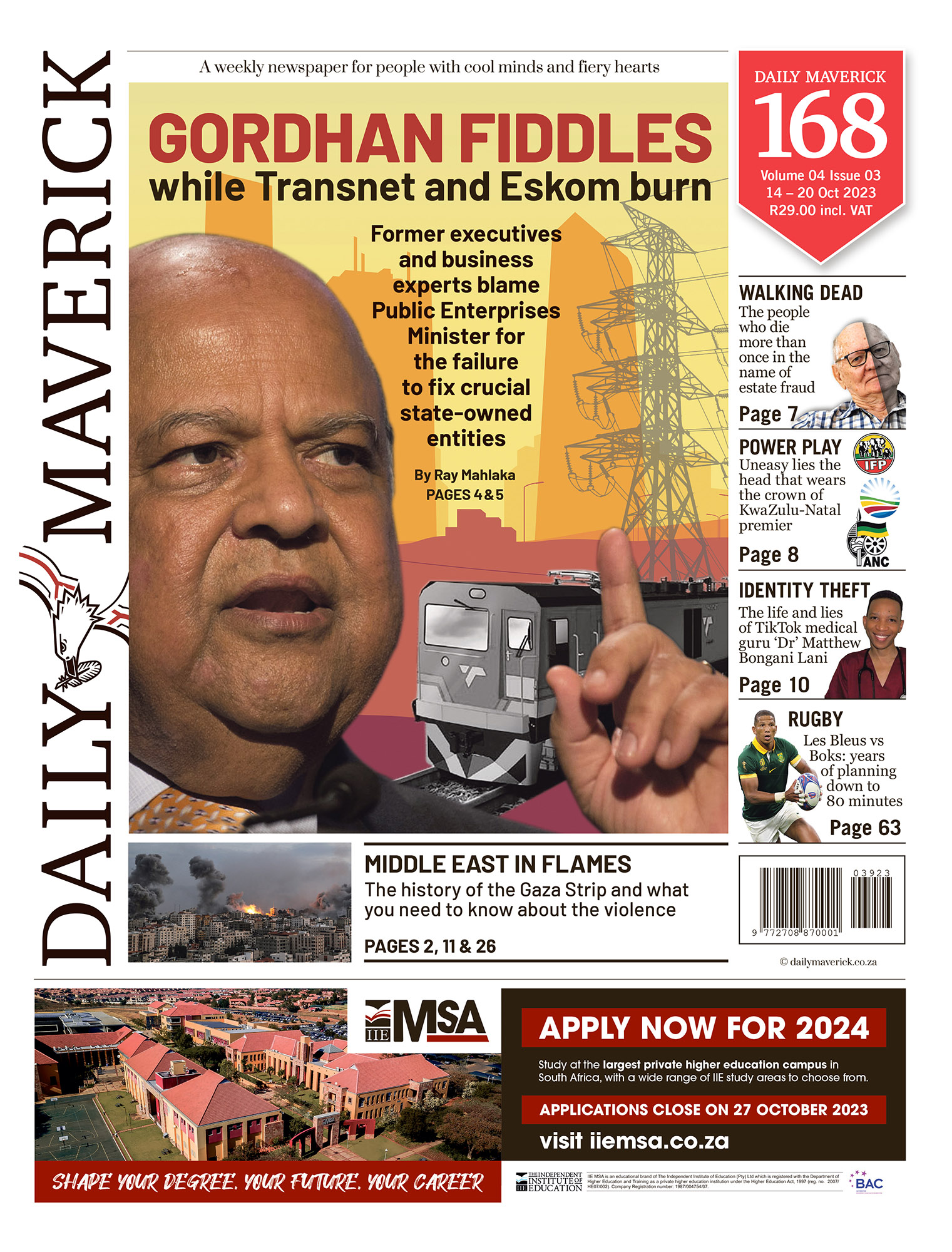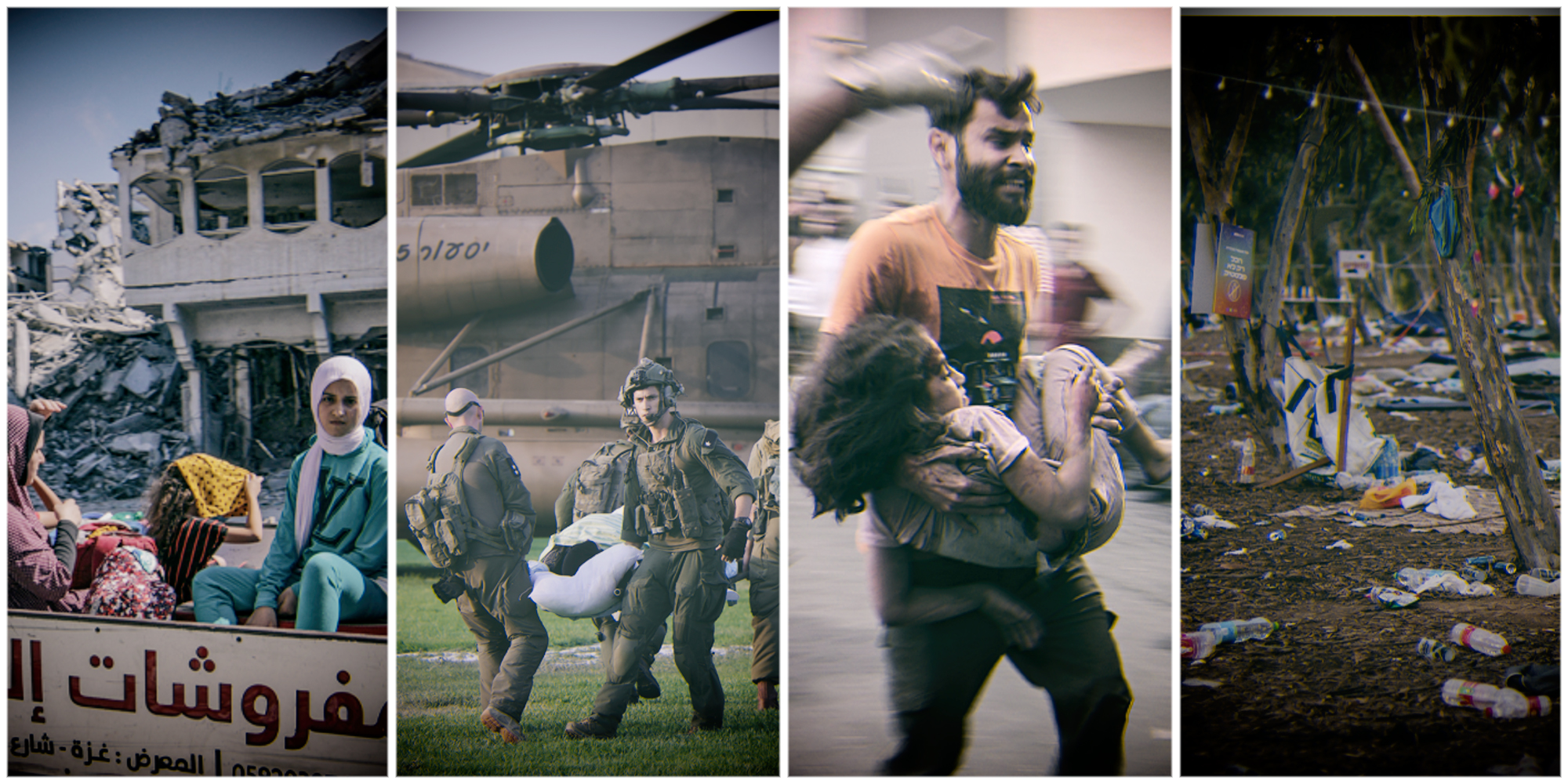Dear DM168 reader,
The big news of this week makes me feel sick to the core.
I watched the survivors of last Saturday’s Hamas attack on Israeli civilians on CNN and Al Jazeera speak about the horror of loved ones being blown apart by hand grenades, shot in the head, in the back, having to hide under dead bodies to evade the attackers; of families, parents, grandparents and children being slaughtered; of loved ones being kidnapped by Hamas fighters and taken to Gaza; and of waiting and waiting for help from the Israeli Defence Force, which arrived too late.
I watched the survivors of the subsequent retaliatory Israeli Defence Force attack on Palestinian civilians as they wandered wounded and broken by the bombardment of buildings in the Gaza Strip. I watched them speak on CNN and Al Jazeera of watching loved ones take their last breath as the buildings collapsed on them; I saw blood pouring down the cheeks of sobbing children, injured and confused.
More than 1,200 Israeli civilians were murdered last weekend on 7 October. More than 1,200 Palestinians living in Gaza were murdered. An eye for an eye. A tooth for a tooth. No turning of the other cheek. A spectre of more and more war, and more and more carnage, because the language of violence seems to be the only way to communicate in this very lopsided 75-year-old conflict.
A conflict that has its roots in the divvying up of spoils of World War 1, after the League of Nations split up the Ottoman Empire and handed Palestine to Britain in 1922, mandating it to secure the establishment of the Jewish national home, and safeguard the civil and religious rights of all the inhabitants of Palestine, irrespective of race and religion.
Realising both Palestinian and Jewish desire for self-government in November 1947, the UN General Assembly adopted Resolution 181(II), which called to divide Palestine into an unnamed “Jewish State” and an unnamed “Arab State” with Jerusalem under UN trusteeship.
That never happened.
Violent clashes escalated, including Zionist paramilitary groups killing hundreds of Palestinian Arabs in Deir Yassin, a village near Jerusalem in April 1948. The UK washed its hands of the Palestine problem and handed it over to the UN in May 1948. On 15 May, Israel declared independence, a day Palestinians mark as Nakba (catastrophe). Jewish territorial expansion forced Arabs off their land, leading to the first exodus of hundreds of thousands of Palestinian refugees. Up until today, no Palestinian State has been established.
The remaining territories of pre-1948 Palestine, the West Bank – including East Jerusalem – and the Gaza Strip were administered from 1948 to 1967 by Jordan and Egypt, respectively.
Since June 1967, the West Bank – including East Jerusalem – and the Gaza Strip have comprised the Occupied Palestinian Territory.
Peace brokering
There have been several international attempts at brokering peace in the Middle East, but none has succeeded. In September 1993, Israel and the PLO signed the Declaration of Principles on Palestinian Self-Rule, the first agreement between the two sides which became generally known as the Oslo Accords. Then PLO leader Yasser Arafat recognised Israel’s right to exist, renounced terrorism and agreed to change the portions of its charter that called for Israel’s destruction. Israel recognised the PLO as the sole representative of the Palestinian people.
Fast-forward 30 years – that accord is in tatters. The militant Hamas vehemently rejected the accord, as did current Israeli Prime Minister Benjamin Netanyahu, who with his far-right coalition has been the target of mass protests by Israelis for his attempts to weaken the independence of the judiciary and to dodge corruption charges.
Journalists at independent Israeli publications The Jerusalem Post and Haaretz have reported that Netanyahu was so opposed to Arafat’s Fatah and Palestinian Authority and a united Palestine that he actively supported Hamas.
Writing in Haaretz this week, Dmitry Shumsky said: “… in 2009, that same Netanyahu developed and advanced a destructive, warped political doctrine that held that strengthening Hamas at the expense of the Palestinian Authority would be good for Israel.
“The purpose of the doctrine was to perpetuate the rift between Hamas in Gaza and the Palestinian Authority in the West Bank. That would preserve the diplomatic paralysis and forever remove the ‘danger' of negotiations with the Palestinians over the partition of Israel into two states – on the argument that the Palestinian Authority doesn’t represent all the Palestinians.”
Mohammed Deif, the leader of the Izz ad-Din al-Qassam Brigades, the armed wing of Hamas, is believed to be the mastermind behind the military operation launched from the Gaza Strip that caught Israel off guard on 7 October.
His motive, according to a recorded speech captured by Al Jazeera, shows that the build-up of years of Israeli blockades, military occupation and disregard of Palestinians’ right to autonomy is the tinder that sparked the horrible violence unleashed last weekend:
“In light of the continuous crimes against our people, and in light of the occupation’s rampage, and its disregard for international laws and resolutions, and in light of the American and Western support [of Israel] and the international silence, we have decided to put an end to all of this, with the help of Allah, so that the enemy understands that the time that it could go on a rampage without being held accountable is over.”
In the Holy Land that gave birth to Judaism, Christianity and Islam, no human life is sacred. No international law is sacred. War crimes are committed on both sides. The Israeli and Palestinian civilians who were callously murdered face to face and in remote air strikes and rocket attacks are not seen as fellow humans, mothers, daughters, brothers, fathers, friends – they are all considered legitimate targets, cannon fodder to coerce the enemy into submission.
I am not sure it will help, but I’m glad that South African President Cyril Ramaphosa has offered to mediate this crisis that is a blight on all humanity. I wish more world leaders would think of ploughing resources into preventing the growing humanitarian catastrophe, and put human life above business deals and the vagaries of global politics to prevent further bloodshed and loss of life, but this war is not my story to tell. Read what an Arab-Israeli journalist, Hanen Majadli, who writes for Haaretz, feels:
“If being a Palestinian Israeli is a complex experience in normal times, it is almost impossible in these times. Because since the start of the war, I and 2 million more Arab citizens are seen as guilty. Because we are quiet, or scared, or because we dared to compare or because – and this is the worst – we talked about context and the occupation.
“I feel it is my duty to object to all the calls for revenge and for blind collective punishment: cutting off water and electricity, mass starvation of a civilian population, the total destruction of the heart of Gaza. None of these things is an appropriate response or a solution. These are war crimes.
“I admit I don’t know what the solution is, but Israel not only did nothing to offer Gazans a horizon of normal life under its military blockade, it did all it could to embitter their lives. Palestinians deserve justice and freedom, and with all my heart I want my people’s liberty not to be soaked in Israelis’ blood, and I dearly hope that there are a few Israelis left who feel the same way.”
Her colleague Gideon Levy, a Jewish Israeli journalist who also writes for Haaretz, had this to share:
“Seventeen years of the blockade closed Gaza off to me. I presume it has changed since then. A new generation was born into even greater despair. But is it possible to remain indifferent, even to joke in some cases, at the sight of the images from Gaza? How is this possible? How is it possible to forget that these are human beings whose ancestors were expelled from their land and placed in refugee camps where they would remain?
“These were human beings whom Israel dispossessed and expelled, whom it conquered again in their land of refuge and then turned into animals in a cage. They’ve experienced indiscriminate bombardments before, but now the worst of all is ahead of them. Israel has already announced that all the restraints it supposedly used in previous attacks will be lifted this time. Yes, hundreds of Gazans committed atrocious crimes, an outgrowth of 17 years of blockade and 75 years of suffering, with a bloody past and no present or future. But not all of Gaza is to blame.
“As I sit in my neighbour’s safe room in Tel Aviv, I can’t help thinking about my friend Munir, who has nowhere to run to in his home in Lakiya, or even the ability to run after the stroke that he suffered. I am thinking about the Gazans now when it seems like no one else in the world cares what happens to them any more.”
Be grateful for troubles that we can fix
Sorry for bringing the troubles of the world to your inbox, but I could not bury my head in the sand. I don’t think any of us can. We can be grateful that our country may have its divisions and differences, but none that we cannot take the time to understand and fix. I truly believe this.
In our lead story in DM168 this week, Business Maverick's Ray Mahlaka finds out what’s potting with Pravin Gordhan’s control-freak behaviour as regards the senior executives of pivotal SOEs Eskom and Transnet.
Other less heavy reads include:
Maverick Citizen reporter Tamsin Metelerkamp writes about a husband-and-wife duo who are working to create a safe space in which local children can learn and grow on a small farm in Redhill, an area that lies between Scarborough and Simon’s Town in Cape Town’s deep south.
Don’t miss getting your funny bone tickled by Shaun de Waal’s satire about renaming diseases and utilities after the ministers who mismanaged them.
Our avid southern African explorer Bridget Hilton-Barber writes about baobabs and the Great Zimbabwe Ruins as she winds her way back to Limpopo.
And, finally, if you are intrigued by the absurd, we have two bizarre stories of identity theft and fraud – one by Michelle Banda about a fresh-faced young man who hoodwinked his social media followers into believing he was a medical practitioner and another by Dianne Hawker about legal loopholes being tightened after a man had to go to court to prove that he was not dead and that he did not have a grandson to whom he bequeathed his estate.
That’s it for today. The jacarandas are blooming in the capital city and, hey, that makes me happy.
Stay connected. Share your thoughts with me at heather@dailymaverick.co.za
Your in defence of truth,
Heather
This story first appeared in our weekly Daily Maverick 168 newspaper, which is available countrywide for R29.






